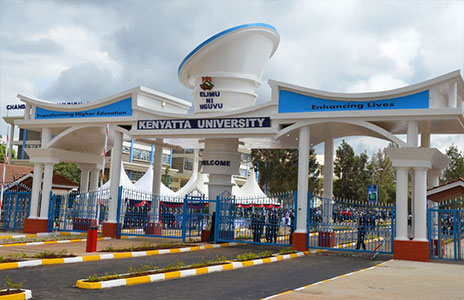
The Bachelor of Commerce (BCom) degree program is a general business course that offers students a wide range of managerial skills that prepares them for careers in business management both in the public and private sectors of the economy and is among the most competitive degree courses in Kenya. Bachelor of commerce students are prepared for careers in a wide range of business-related fields by exposing them to an array of business principles.
Some of the subjects or units covered in a BCom curriculum include entrepreneurship, accounting, finance, economics, information systems, calculus, statistics, actuarial studies, business management, business administration, business ethics, commercial law, supply chain management, human resources, marketing, risk management, and business logistics.
The BCom curriculum has a strong emphasis on project work, building problems solving and critical thinking skills needed by professionals in the corporate world. By the end of the program, the Bcom graduate should exhibit strong business orientation and knowledge, strong business ethics, and demonstrate adequate business research skills.
BCom is a good option for students who want to make a career in commerce, accounting, finance, banking, and insurance. After completing BCom, graduates are also eligible to pursue careers in management, teaching, advertising, law, journalism, mass communication, design, and many other business-related fields.
Entry Requirements
Candidates shall be admitted to the degree of Bachelor of Commerce upon satisfying the minimum entrance requirement of the University as well as meet the following minimum entrance qualifications.
- Mean grade of KCSE C+ or equivalent with at least C (plain) in at least one subject in each of the following cluster subjects:
- English/Kiswahili
- Mathematics A / Mathematics B / Business Studies / Any Group II
- Any Group III
- Any Group II / 2nd Group III / Any Group IV / Any Group V
- An advanced Level certificate with 2 principal passes and a credit pass in Mathematics at O-Level
- Degree from a recognized university
- Diploma in a relevant field from a recognized institution OR CPA/CPS Part II or equivalent with at least Mean grade of C (plain) at KCSE and C (plain) in Mathematics and English.
KCSE Subject Grouping
Group I: English, Kiswahili, Mathematics
Group II: Biology, Physics, Chemistry
Group III: History and Government, Geography, Christian Religious Education, Islamic Religious Education,
Hindu Religious Education
Group IV: Home Science, Art and Design, Agriculture, Aviation Technology, Computer Studies
Group V: French, German, Arabic, Music, Business Studies
Objectives of Bachelor of Commerce
The rationale of the Bachelor of Commerce degree program is to provide students with a wide range of business management skills, knowledge, and attitudes that will make them effective managers and leaders in a dynamic and global economy in both public and private business enterprises.
To better prepare you for a specialized role in the business environment as a BCom graduate, you are required to choose a specialization area in your final years of study in either of the following concentrations: Finance, Accounting, Banking, Entrepreneurship, Human Resources Management, Marketing, General Management, Leadership, and Ethics or Information Systems. In some instances, you may be allowed to select two specialization areas depending on your grades in the first two years of study.
Accounting concentration
This concentration prepares you to become an integral part of an organization?s financial management team or to enter the public sector as an auditor, tax specialist, or consultant. Government, non-profit organizations, major corporations, small businesses, and high-worth individuals all need accountants to manage their financial affairs. Upon graduation, most students choose to pursue the Chartered Professional Accountant (CPA) designation.
Finance Concentration
This concentration is a demanding program that prepares you to play an important role in the financial industry. The profession is divided into two main fields: managerial finance and investments.
Investments deal with managing savings in the economy by transferring them to individuals and corporations in need of capital in exchange for an appropriate return. Professionals spend their time designing, pricing, and trading investment instruments such as term deposits, personal loans, stocks, bonds, and asset-backed securities to aid in the flow of funds. Some of our economy's biggest corporations, including banks, mutual fund companies, private equity firms, and insurance companies, serve as intermediaries in this process.
In managerial finance, professionals arrange required financing for an organization's daily operations and future growth. Sources of capital such as lines of credit, corporate paper, term loans, mortgages, bonds, leases, venture capital, and IPOs are used to finance seasonal build-ups in working capital and major asset purchases. In doing this, financial managers are careful not to expose the organization to unacceptable levels of risk by over-borrowing or leaving exposures to currency or interest rate fluctuations unhedged.
Upon graduation, an increasing number of students go on to complete professional designations such as the Chartered Financial Analyst (CFA), Certified Financial Planner (CFP), or one of the many financial training programs offered by the Canadian Securities Institute.
Banking Concentration
The BCom with a major in Banking is suitable for students seeking a solid educational foundation in banking, with the option for a career as a specialist or manager in the banking sector. This Bachelor of Commerce degree is designed to help fast-track your career in banking. It provides practical skills and an understanding of banking and business topics. It can also lay the foundation for further studies.
The banking sector has evolved into an industry that employs highly skilled individuals. Solid knowledge in advanced banking concepts and how a bank operates as a business are required at a minimum. Apart from this, specialized knowledge of different areas of banking and analytical/research skills are expected from candidates applying for jobs in more senior roles.
Innovation and Entrepreneurship Concentration
The Bachelor of Commerce with a specialization in Innovation and Entrepreneurship is designed for graduates of the future. The world is rapidly changing and employers are increasingly looking for the next generation of graduates who are experts in their chosen field but who can also apply innovative thinking and entrepreneurial flair.
This BCom major enables you to think distinctively, creatively, and critically in a business environment. It provides the skills required to develop entrepreneurial ideas into successful new ventures, or work within existing businesses in an innovative way.
General Management Concentration
This concentration is designed for you if you do not want to specialize in a specific area of business but would like to take an array of courses instead to receive greater breadth in your management education or if you want to focus on a specialized field of your own choosing. Many positions in business require the varied skills that a generalist can offer.
Human Resources Concentration
This concentration prepares you to pursue the Certified Human Resource Professional (CHRP) designation, which is increasingly becoming a requirement for advancement in the field. Human resources management professionals are the employee relations specialists who manage employee planning, recruitment, selection, compensation, training and development, health and safety, and evaluation. They are also active in labor relations, taking the lead in union contract negotiations, grievance handling, including mediation and arbitration, and all other employee-related matters, such as wrongful dismissal, personal harassment, and privacy.
Leadership Concentration
This concentration focuses on the development of the knowledge and skills necessary to be an effective leader in today's dynamic work environment.
Marketing Concentration
This concentration prepares you to assume one of the most important roles in business. Marketers are a company's creative force, focusing on the marketing mix also known as the four "Ps": product, price, promotion, and place. They devise potentially profitable new product ideas that meet the needs of specific target markets and then develop and execute the detailed plans needed for their implementation. Other employees in accounting, finance, or human resource management simply assist marketing professionals in this primary task and depend on them to generate the revenues required for a company's survival.
Public Sector Management Concentration
This concentration provides you with the knowledge and skills required to work in a leadership capacity in County or National government or in the non-profit sector.
Information Systems Concentration
This concentration is intended for you if you have previously completed a technology-related diploma. Courses in the concentration normally consist of credits completed in technology prior to admission. Upon graduation, students are well prepared for management positions in the information technology industry.
The degree of Bachelor of Commerce (Information Systems) is designed for students who wish to specialize in Information Systems (IS). Information systems specialists focus on integrating information technology solutions and business processes to meet the information needs of businesses, the community, and the government. The goal is to enable them to achieve their objectives in an effective and efficient manner. This discipline?s perspective of ?Information Technology? emphasizes information and sees technology as an instrument to enable the generation, processing, and distribution of needed information.
What you will study
In the Bachelor of Commerce programme, students are expected to take a minimum of 49 units to qualify for graduation. During the first year and second year, all the units are common, in the third, students move to specializations of their choice. The Bachelor of Commerce Undergraduate programme shall extend over a period of four (4) academic years.
Bachelor of Commerce Units
Level 1
- Communication Skills
- Development Studies
- Introduction to Critical and Creative Thinking
- Fundamental of Accounting I
- Fundamentals of Accounting II
- Business Studies
- Business Law I
- Principles of Management
- Management Mathematics I
- Introduction to Insurance
- Management Mathematics II
- Microeconomics Theory I
- Macroeconomics Theory II
Level 2
- Accounting for Assets
- Accounting for Liabilities and Equities
- Cost Accounting I
- Business Finance I
- Business Finance II
- Organization Behaviour
- Principles of Marketing
- Business Statistics I
- Risk Management
- Computer Programming
- Microeconomic Theory I
- Macroeconomic Theory II
Level 3
- Management Accounting I
- Organization Theory
- Human Resource Management I
- Business Law II
- Public Finance
- Research Methods
Accounting Option
- Advanced Financial Accounting I
- Advanced Financial Accounting II
- Principles of Auditing
- Fundamentals of Taxation
- Bankruptcy and Reorganization
- Financial Ethics
Finance Option
- Financial Markets and Institutions
- Corporate Finance
- Financial Derivatives
- Economics of Money and Banking
- Management of Financial Institutions
- Financial Ethics
Marketing Option
- Marketing of Services
- Marketing Strategies and Plans
- Consumer Behaviour
- International Marketing
- Marketing Research
- Labour Economics
- Entrepreneurship & Small Business Management (Elective)
- Business Communication (Elective)
- Office Management (Elective)
- Management of Cooperatives (Elective)
- Recruiting and Staffing (Elective)
Human Resource Management Option
- Human Resource Management II
- Employee, Training and Development
- Public Relations
- Work and Reward
- Labour Economics
- Entrepreneurship & Small Business Management (Elective)
- Business Communication (Elective)
- Office Management (Elective)
- Management of Cooperatives (Elective)
- Recruiting and Staffing (Elective)
Management Science Option
- Systems Analysis & Design
- Operations Research 1
- Applied Statistical Methods
- Database Design & Management
- Operations Research II
- Data Communications (Elective)
- Computer Simulations (Elective)
Actuarial Science Option
- Pensions
- Actuarial Science I
- Re-Insurance
- Life Contingencies
- Demographic Statistics
- Insurance Law (Elective)
- Property Insurance (Elective)
- Financial Operations of Insurance Markets (Elective)
Procurement and Supply Chain Option
- Principles of Supply Chain Management
- Procurement Management
- Logistics Management
- Storage and Warehouse Management
- Supplier Quality Management
- Generation of Requirements
Level 4
- Business Policy and Decisions
- Company Law
- Management of International Business
- Management Information System
Accounting Option
- Tax Laws and Practice
- Auditing Practice and Investigation
- Specialized Financial Accounting
- Management Accounting II
- Cost Accounting II
- Accounting Theory
- Public Sector Accounting
- Trust and Executorships
Finance Option
- International Financial Management
- Financial Statement Analysis
- Applied Investment
- Entrepreneurial Finance
- Econometric Models and Methods
- Monetary Theory and Policy
- Marketing of Financial Services
- Real Estate Finance
Marketing Option
- Sales Management
- Innovation and New Product Management
- Advertising Management
- Retail Marketing Management
- Industrial Marketing
- Agricultural Marketing
- Selected Topics in Business Strategies (Elective)
- Applied Marketing Research (Elective)
- Management of Public Enterprises (Elective)
- Commercial Law (Elective)
- Agricultural Economics (Elective)
- Economics of Industry (Elective)
- Sociology of Work, Management and Employment (Elective)
Human Resource Management Option
- Industrial and Labour Relations
- Employee counselling and Crisis Management
- Total Quality Management
- Occupational Health and Safety Management
- Industrial Psychology
- Contemporary Issues in HRM
- Selected Topics in Business Strategies (Elective)
- Applied Marketing Research (Elective)
- Management of Public Enterprises (Elective)
- Commercial Law (Elective)
- Agricultural Economics (Elective)
- Economics of Industry (Elective)
- Sociology of Work, Management and Employment (Elective)
Management Science Option
- Production & Operations Management
- Advanced Operations Research
- Econometric Models & Methods
- Decision Support & Expert Systems
- Project Management
- Electronic Commerce (Elective)
- Research Project (Elective)
- Project Monitoring & Evaluation (Elective)
Actuarial Science Option
- Loss Models
- Graduation Mathematics
- Insurance Brokerage
- Credibility and Ruin Theory
- Actuarial Science II
- Assurance of the Person (Elective)
- Marine Insurance (Elective)
- International Insurance Market (Elective)
- Motor Insurance (Elective)
- Liability Insurance(Elective)
- Medical Insurance (Elective)
Procurement and Supply Chain Option
- Production and Operations Management
- Procurement & Supply Law
- Supplier Relationship Management
- Total Quality Management
- Negotiation Skills
- Strategic Procurement Management
- Public Procurement Management (Elective)
- International Purchasing (Elective)
Related articles
-

A Guide to Civil Engineering Degree and Diploma Programs in Kenya
08-Nov-2025 -

Electrical Engineering in Kenya: A 2025 Guide for KCSE Graduates
08-Nov-2025 -

Mechanical Engineering in Kenya: A 2025 Guide for KCSE Graduates
08-Nov-2025 -

Engineering Courses in Kenya: A Guide for 2025 KCSE Graduates
08-Nov-2025 -

Education Pathways in Kenya — From Basic Education to Tertiary | College Guide
06-Nov-2025 -

The Bird and the Mirror: A Reflection on Identity, Perception, and Illusion
07-Feb-2025
Colleges offering Bachelor of Commerce

Starehe
University of Nairobi

Ruiru
Kenyatta University

Nyeri Town
Dedan Kimathi University of Technology

Kitui West
South Eastern Kenya University

Kirinyaga Central
Kirinyaga University

Laikipia West
Laikipia University

Likoni
Maasai Mara University

Starehe
Technical University of Kenya

Kilifi South
